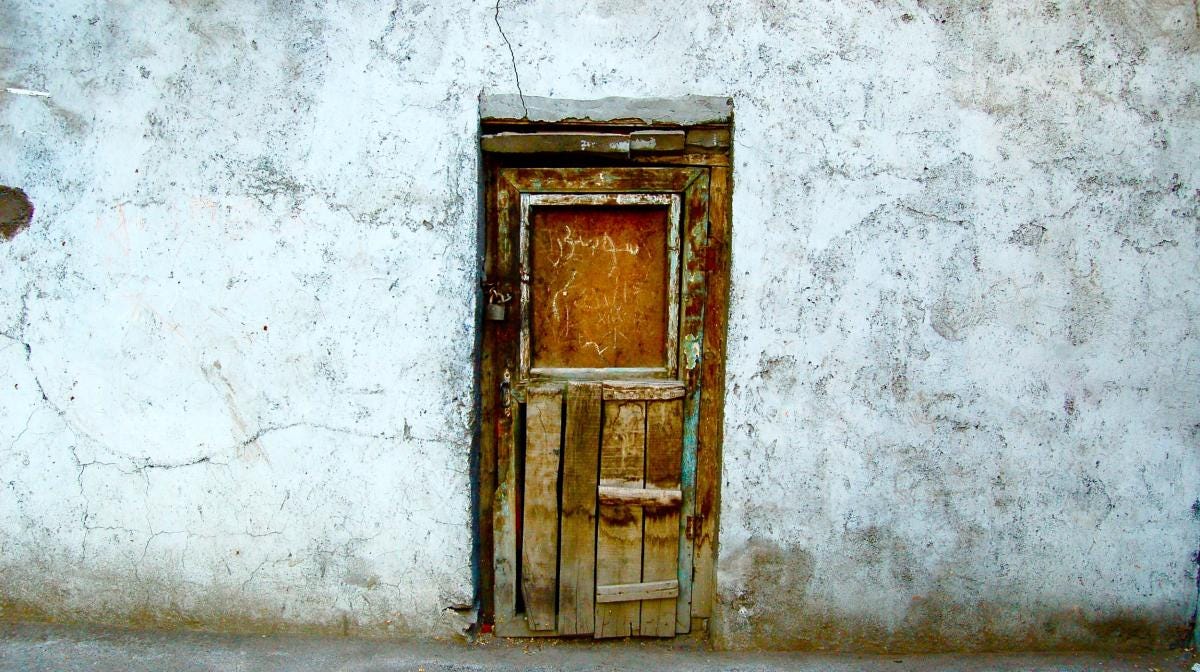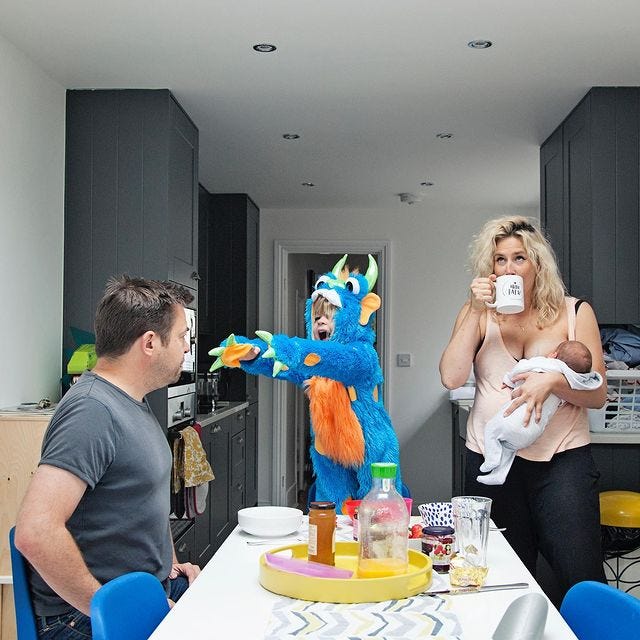Behind Closed Doors
Practising modesty in the digital Eye of Sauron
Another day, another divorce celebration story in the Times. I’ve written elsewhere about the reverse survivorship bias that skews media content toward stories of marriage collapse rather than survival. But in the case of this exemplar, I was struck by how its author, an Instagram parenting influencer, included no mention of the recursive effect documenting her family life online might have on the family itself.
But I’d be surprised if there was no impact. By comparison with Mother Pukka, my platform is modest. But if there’s something I’ve learned since I began writing in public, it’s that the pressure to self-disclose is constant, and self-disclosure is a two-edged sword.
It brings many positives: a heightened closeness with readers, and sometimes also of honesty. It often feels necessary to explain why a topic is important to me. Feedback from readers suggests that many appreciate a writer who is willing to argue from the heart as well as the head - which means being willing to speak personally. But I also wrestle constantly with the question of what is, or is not, a proper topic of discussion for the public digital domain.
It’s too late to be something other than a writer online, or to be that writer, but anon. Instead, I walk an ambivalent line between public disclosure, under my own name, and a desire to shield my family life from internet scrutiny.
Some general principles I’ve settled on, in the process, include:
no pictures of my child or husband
no selfies
no discussion of any of my interpersonal relationships except with the other party’s explicit consent
pictures of friends only in a professional context
self-disclosure only in the context of wider argument
This is a great deal more restrictive than the approach taken by many who post under their own names. Why? Well, if the post-print norm of standpoint epistemology has made self-disclosure a matter of basic due diligence, self-disclosure also invariably makes the disclosee an object for secondary discourses.
You see this all the time: a video (like this one of fitness influencer Alison Johnson, for example) will go viral. The ensuing argument will pay no attention whatsoever to how the person who offered themselves in this way feels about it. And I don’t really want to know what does it do to a family, when moments from your intimate life are being shared as a jumping-off point for others’ discourse - or even as sponsored content for marketers.
The point of this essay is not having a go at Mother Pukka for her choices. But whether it’s Mother Pukka, or a fitness influencer on TikTok, or someone else, content of this kind tends to waver between showing where the creator stands in relation to a topic or argument, and the creator being the argument; a dynamic that, at extremes, can become what I’ve called ‘pornography of the self’.
For the digital domain, left unchecked, seeks to extend the logic of the market ever further into the human heart, by enclosing and productising emotion and relationship. A sense of access to other people’s intimate lives is what keeps people clicking; so the machine lavishly rewards every gobbet of intimacy you are willing to feed into it. And while Mother Pukka and Alison Johnson both seem some way from total self-productisation, a professional profile that relies on intimate photos and videos makes self-disclosure central to both their products. Pictures of the kids; footage in bed or half-dressed or kissing the boyfriend; sometimes wrenchingly personal accounts of fear, uncertainty, or stress. Once such material is a source of income and professional clout, the disclosures have to keep coming: the machine always wants more.
And this is the two-edged sword. In the smartphone age it’s difficult enough, as a parent, to avoid the temptation to stop colouring or pumpkin-carving or whatever with your kid and take a photo of what you’re doing for the grandparents. So what happens when it’s not just grandparents, but an audience of thousands, perhaps hundreds of thousands? What is it like to have a marital argument, in full knowledge that your heartfelt feelings might form the basis of your spouse’s viral post the following day? What would it be like, as a child, to do pumpkin carving with Mummy, while intuiting at some level that you’re not just making memories but also sponcon? Is it even possible to have intimate relationships, when the all-pervasive incentive at every moment is to expose intimate details of those relationships for clicks?
In my own writing, I sometimes share my own standpoint, where the argument calls for it. This essay is a case in point. And this means that readers come to expect self-disclosure, and sometimes to make inferences from what you leave out. For example I remember someone on Twitter remarking that I almost never write about my marriage, and declaring confidently, on this basis, that it must be doomed. But the reason I don’t talk about my marriage is that it doesn’t just belong to me. Even if I wanted to, I don’t have the right to mine it for content.
In the print era, governed by a relative scarcity of information, we came to believe that all “openness” was by definition good. The early internet inherited that belief: it’s at the heart of the utopian vision that powered the first bulletin boards. But I’ve come to think this is a mistake. Rather, in the digital order, not all openness is good. Sometimes deliberate occlusion is better.
Perhaps the word we should reclaim for this practice is “modesty”. This should be understood in a much broader context than showing skin, or behaving in an overtly sexual way. Digital modesty is a general disposition: an effort, however difficult it is in practice, to avoid any form of online self-presentation that veers into spectacle.
Understood thus, such a practice of modesty implies much more than “privacy”, which most understand today as something conferred by laws, conventions, rules, and rights. The kind of digital modesty able to hold space for intimate family life has to be more: a deliberate practice of self-veiling, against constant pressure in the other direction.
But without such a practice, there is no intimate domain that can’t become sponcon; no relationship that can’t be strip-mined for clout. And relationships thus mined are quickly exhausted. An economy of total exposure would be one of total alienation.
There’s a great deal more to say about the Faustian bargain that is self-disclosure in the digital age. But rightly or wrongly, I believe we can and should learn to veil ourselves, under the digital eye of Sauron. And I believe that to the extent that we manage this, we can still reap the benefits of digital connection, while limiting its incursions into our hearts, and our hearths.




I agree. I broke the habit of sharing cute family moments on social media almost 3 years ago. I wasn’t making any money off it; it was purely to share with family, friends and acquaintances and experience their attention and approval, through love emojis etc. But doing such a thing regularly creates a performative perspective: the awareness of an audience absolutely does creep into the intimate moments. It took me months after quitting to stop thinking in “Facebook updates” Occasionally, one will still pop into my head. But I no longer feel any desire to share my private life on this performative way, and on the rare occasions I do make a Facebook post it’s with a great deal of thought and even anxiety: the dopamine rush is gone.
The other side of this is I do feel a desire to be visible, to be connected, ti take risks and be part of a larger discourse. But this desire predates social media and having ceased creating social media content, I can seek to better understand it. For me, writing more thoughtful, rare, and lengthy posts on my blogs feels more authentic. They don’t get anything like the attention my Facebook posts did, but then if I’m honest with myself, nobody owes me their attention. I’m not that special. A few people have said they miss my Facebook presence, but the ones that really care, can get ahold of me other ways. If they don’t want to, then I don’t need to be there for their entertainment (as the song says LOL).
As a teacher of 13/14 yos, I can see the impact of this on the development of kids. No more are the boundaries between ... well anything. They have no concept of the division between home and school, formal or informal, appropriate or inappropriate. All lines have been blurred (thanks post moderns). A student shared the other day that he had to fart. First time in my career for that; also for kids mocking me - while I'm right there! They all think they're little social media stars.
Growing up in an age where nothing is private, nothing is sacred, nothing is not worth sharing, please get me a time machine. I'm just grateful for memories.